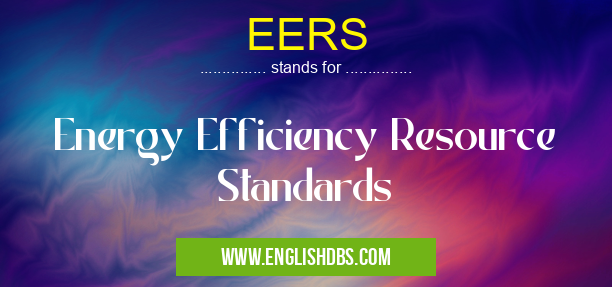What does EERS mean in ENERGY
Energy Efficiency Resource Standards (EERS) are measures put in place by governments to ensure energy conservation. These standards are developed to reduce energy costs, reduce carbon emissions and meet environmental goals. EERS are necessary for governments to achieve their policy objectives for energy conservation and sustainability.

EERS meaning in Energy in Governmental
EERS mostly used in an acronym Energy in Category Governmental that means Energy Efficiency Resource Standards
Shorthand: EERS,
Full Form: Energy Efficiency Resource Standards
For more information of "Energy Efficiency Resource Standards", see the section below.
» Governmental » Energy
What is the Meaning of EERS?
EERS stands for Energy Efficiency Resource Standards, and is a set of requirements that govern how electricity or other resources must be used and managed in order to conserve energy, improve efficiency, and reduce levels of air pollution. This concept was developed as part of government policies on energy consumption. Governments do this in order to meet their renewable energy targets, combat climate change, and reduce overall emissions from sectors such as transportation and industrial production. EERS apply regulations on industries that use electricity or fossil fuels through criteria outlining minimum levels of power efficiency. These standards set limits on electricity consumption per unit of activity as well as maximum levels per capita. Companies or organizations must abide by these regulations with some being able to draw upon exemptions depending on the size of operations or other factors. Furthermore, governments incentivize people to use more efficient energy systems by providing rewards such as tax breaks or subsidies for installation of appropriate technology.
Essential Questions and Answers on Energy Efficiency Resource Standards in "GOVERNMENTAL»ENERGY"
What is the Energy Efficiency Resource Standard (EERS)?
The Energy Efficiency Resource Standard (EERS) is a policy incentive that helps utility companies, states and local governments reduce energy consumption and promote clean energy use. It serves as a template for defining an energy efficiency program in terms of goals, objectives, performance measures, verification and reporting requirements.
How can I benefit from EERS?
EERS provides homes and businesses with incentives to adopt energy efficient practices such as installing energy efficient heating and cooling systems, using LED lighting or replacing old appliances with ENERGY STAR® certified models. By investing in these types of projects, you may be eligible for rebates or other incentives from your utility company while saving money on your monthly energy bill.
Who enforces the EERS?
The regulations governing the implementation of the EERS vary by state and Eligible Jurisdiction. In most cases, utility companies are responsible for setting up programs to ensure customers have access to eligible measures that help reduce their electricity use or costs. Local governments are also heavily involved with overseeing and implementing the various standards within each jurisdiction.
What are some of the common goals of EERS?
The primary goal of EERS is to promote energy efficiency through reducing electricity consumption or costs. This can be achieved through promoting renewable resources such as solar power or wind turbines, providing customers rebates or incentives for purchasing ENERGY STAR® products, increasing awareness of available energy efficiency options, and encouraging residential and commercial building retrofits among many others.
Who determines which areas are eligible for implementing the Energy Efficiency Resource Standard (EERS)?
Each Eligible Jurisdiction defines its own eligibility criteria for implementating EERS initiatives according to specific geographic areas within their boundaries. Generally speaking, eligibility can depend on certain environmental factors like air quality levels or economic conditions like unemployment rates as outlined in each jurisdiction’s regulation documents.
How will I know if my area is eligible for an EERS initiative?
Your local utility company should be able to provide information about available initiatives in your area that qualify under an eligible Energy Efficiency Resource Standard (EERS). Most jurisdictions also require annual reports summarizing progress so you can review previous program results before enrolling yourself in any new incentive programs available in your area.
Does participating in an EERS initiative cost anything?
Depending on what type of initiative you choose to participate in there may be costs associated with taking part in an Energy Efficiency Resource Standard (EERS) program but typically those fees can still be recouped due to savings generated from the investment over time. Many jurisdictions also provide low-income households assistance programs that cover all associated expenses when enrolling into an approved plan.
Are there time restrictions associated with participating in an EERS program?
Yes there are generally deadlines associated with achieving goals outlined by individual projects under an Energy Efficiency Resource Standard (EERS) plan however they may vary depending on how ambitious a particular program’s goals are set out to achieve compared to others within its jurisdiction.
How do I verify progress made toward achieving my project’s goals when taking part in an Energy Efficiency Resource Standard (EERS) program?
You will need to refer back to the rules defined by your local Eligible Jurisdiction’s regulations regarding implementation details regarding project monitoring and verification procedures adopted by them at different stages throughout the course of completed projects.
Final Words:
In conclusion, governments employ EERS in order to mitigate climate change while preserving economic growth and meeting environmental goals regarding global warming emissions control based on set requirements around the resource usage including its time, volume, price, quality etc. Through these standards organizations can lower their costs significantly while reducing their environmental footprints associated with resource extraction and utilization. Additionally individual households have gain access to incentives when they install cost-effective technologies that help save money while conserving resources over time which helps contribute towards broader goals regarding responsible stewardship over the environment through policy initiatives focused on innovation in this area.
